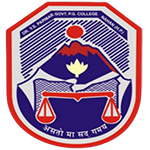Department of Public Administration
The esteemed Department of Public Administration at Dr. Y.S. Parmar Govt. PG College Nahan is presenting the BA program with a specialization in Public Administration, operating seamlessly within the Choice Based Credit System (CBCS). This meticulously structured degree program provided by the esteemed Department comprises Discipline Specific Core and Elective Courses, Skill Enhancement Courses, and Generic Elective Courses. The assortment of courses meticulously designed and offered by this department paves the way for a comprehensive and successful journey towards the attainment of a graduation degree in Public Administration.
Yearly Student Enrollments
| COURSE | YEAR | TOTAL |
|---|---|---|
| B.A. (Public Adm.) | 1st Year | – |
| B.A. (Public Adm.) | 2nd Year | – |
| B.A. (Public Adm.) | 3rd Year | – |
Eigibility Criteria
| Programme/Course/Level | Duration | Eligibility | Adimission Procedure |
|---|---|---|---|
| B.A. / UG | 3 Years | 10+2 | On merit basis |
Faculty Members
Dr. Sarita Bansal
Assistant Professor
| Name | Designation | Teaching Experience | Mobile | |
|---|---|---|---|---|
| Dr. Sarita Bansal | Assistant Professor | – Years | – | – |
Courses offered in the Department
| YEAR | DISCIPLINE SPECIFIC CORE (DSC) COURSE (COMPULSORY) | COURSE CODE |
|---|---|---|
| I | Administrative Theory | PUBA 101-A |
| I | Indian Administration | PUBA 102-A |
| II | Administrative Thinkers | PUBA 201A |
| II | Development Administration | PUBA 202A |
| YEAR | DISCIPLINE SPECIFIC ELECTIVE (DSE) | COURSE CODE |
|---|---|---|
| DSE – GROUP I (One out of the Following) | ||
| III | Local Governance | PUBA 303A |
| III | Contemporary Issues and Concerns in Indian Administration | PUBA 304A |
| DSE – GROUP II (One out of the Following) | ||
| III | Public Policy & Administration in India | PUBA 305A |
| III | Financial Administration | PUBA 306A |
| YEAR | SKILL ENHANCEMENT COURSE (SEC) | COURSE CODE |
|---|---|---|
| II | Computer Applications & Office Management | PUBA 203A |
| II | Human Resource & Logistic Management | PUBA 204A |
| III | Leadership Styles & Conflict Management | PUBA 301A |
| III | Stress & Time Management | PUBA 302A |
Courses offered in the Department
| YEAR | COURSE | CODE | TITLE | COURSE OUTCOME |
|---|---|---|---|---|
| BA I | DSC 1A | PUBA 101A | Administrative Theory | Introductory paper to acquaint the students with Public Administration to expose students the principles and practices of the subject. |
| BA I | DSC 2B | PUBA 102A | Indian Administration | Basic features of Public Administration which focus on some distinct constitutional authorities |
| BA II | DSC 1C | PUBA 201A | Administrative Thinkers | Introduces students to the classical thinkers and their contributions. |
| BA II | DSC 1D | PUBA 202A | Development Administration | Highlights the main areas like Niti Aayog, Panchayati Raj, Political Parties and Bureaucracy and their role in the development of the country. |
| BA II | SEC 1A | PUBA 203A | Computer Awareness and Office Management | Introduces basic components and features of computer and to give insight about office management. |
| BA II | SEC 2B | PUBA 204A | Human Resource and Logistic Management | Highlights importance of human as resource and movement of necessary resources and utility items for the need of the citizens. |
| BA III | SEC 3C | PUBA 301A | Leadership Style and Conflict Management | The course helps to inculcate leadership qualities to help and guide general masses and to resolve the main issues related to the conflicts. |
| BA III | SEC 4D | PUBA 302A | Stress and Time Management | The paper elaborates how to cope with stress related to increased work load for effective management. |
| BA III | DSC 1A | PUBA 303A | Local Government | Introduces about the grass root rural and urban organizations and their role in the governance of the country. |
| BA III | DSC 1A | PUBA 303A | Local Government | Introduces about the grass root rural and urban organizations and their role in the governance of the country. |
| BA III | DSC 1B | PUBA 305A | Financial Administration | The paper highlights the importance of role and function of the Ministry of Finance and other related institutions. |
| BA III | GE 1 | PUBA 307A | Constitutional and Administrative Aspects of HP | Historical aspects of formation of the state area wise as well as proliferation of administrative framework. |
| BA III | GE 2 | PUBA 308A | Disaster Management | Highlights the role of main organizations for disaster management like NDRF and NDMA and awareness and training of local people to manage disasters. |

